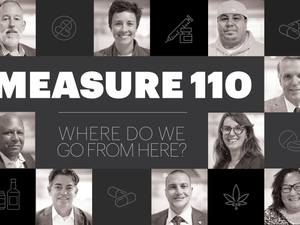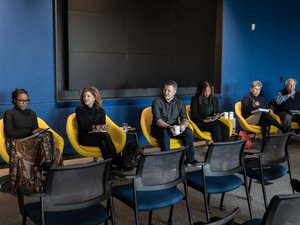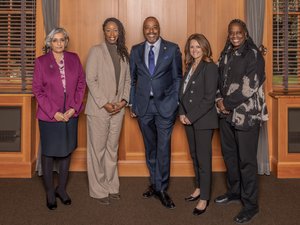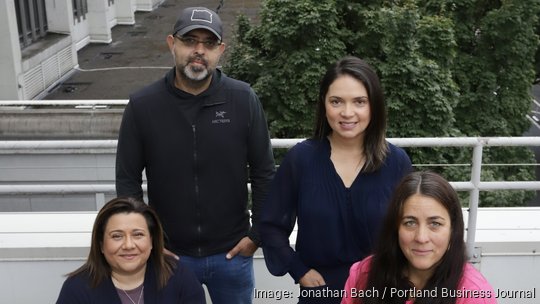
Access to capital is always a hot topic among business owners of all stripes. This year, amid regional banking challenges (See: Silicon Valley Bank, First Republic, et al), a pullback in venture funding and even changes in federal tax code hitting white collar firms, the money issue remains top of mind.
Fall also marks Hispanic Heritage Month, which took place between Sept. 15 and Oct. 15. To mark the occasion, the Business Journal gathered four leaders of Hispanic-owned businesses to discuss their Portland operations and analyze the landscape for 2024.
Capital, in terms of finding it and maintaining access to it, ranked among the top of the group’s concerns.
We sat down with:
Nikki Guerrero, founder and owner of Hot Mama Salsa. The company makes fresh salsa, hot sauce, Mexican style chili oil and tortilla chips. The company has 14 employees and its products are found in regional and local grocers.
Junea Rocha, co-founder and chief marketing officer of Brazi Bites. The company makes South American inspired frozen foods and is known for its Brazilian cheese bread. The company has 20 employees and is found in more than 15,000 retailers nationwide.
Karina Ruiz, co-founder and principal at BRIC Architecture. The firm specializes in designing learning environments in public schools, community colleges, universities and nonprofits. It recently started expanding regionally with its first major project in the Seattle area. The firm has 50 employees.
Jaime Soltero Jr., founder and owner of Tamale Boy. The company started as a catering company before becoming a food cart and, eventually, a brick-and-mortar restaurant. The company has three locations, with two in Portland and one in Happy Valley, and employs 45 workers.
Rocha and Soltero both noted that landing bank lending took more effort than they’d expected, as their businesses had strong track records.
For his part, Soltero, in attempting to get a loan for property, secured lending from the SBA and worked with the person selling the property. Because the loan was property-backed, his challenges perhaps paled compared to others in the same situation.
Rocha faced hurdles in getting a line of credit to build inventory.
“It was harder to get than we thought for a company that’s been around for a decade that has consistent distribution and ongoing revenue,” she said. Last year, Brazi Bites projected collecting $25 million in revenue.
On what 2023 was like for their business, and whether things are better, worse or the same as they were last year
Jaime Soltero Jr.: I’m going to say a little bit worse, getting nervous, holding on. In 2022, it seemed like everybody was back at it, going gangbusters. This year, everybody’s kind of watching their wallets. The employee situation has gotten better. 2022 was rough. For me, lately, there’s been the struggle of every day (occurrences), the mayhem of break-ins, of graffiti, of all the external costs that are unnecessary. And, putting a damper on it, we can’t get insurance if we claim stuff, because we’ll get dropped. So we’re just eating up all of those costs. I had three people go to (my) Dekum (store) this week and try to break in or take stuff.
Nikki Guerrero: I would describe 2023 as a roller coaster. With just so many increases in prices, we’re still feeling issues with packaging and supplies, and things being so volatile. Even with the workforce, I think a lot of people who did work through the pandemic have now decided it’s time to take a break. I’m still feeling a lot of volatility in the workforce. And I also have a big part of my staff (in production) that doesn’t want to commit to 40 hours. I think that’s becoming more of a norm for people who have multiple streams of income to not want to (work) full time in one location.
Karina Ruiz: 2023 has been pretty consistent with 2022. The majority of the work that we do is public education work. People still need schools, schools need to be renovated and built new. We’re forecasting the same revenue, a little bit better revenue than we had last year. What we’re seeing is the types of projects are different. There was a big push in 2021-22 toward new construction, and we’re seeing a lot more remodels (now) but still the same volume of projects.
For us, the workforce is stable. There was kind of that rebound post-Covid, when everybody was excited being back in the office. And now it’s trying to find that balance of hybrid work. (We are) trying to find that appropriate work life balance. But in terms of our business, we’ve been fortunate in that it has continued to be stable, continued to grow. As a company, we’ve hired a number of folks this year.
Junea Rocha: For Brazi Bites 2023 is a better year. We are projected to grow this year, not massive growth, but growing, which, I think any growth in this environment is very positive. We were much more impacted by ‘21 and ‘22, with supply chain disruptions and cost of goods. All of that stuff in ‘21 and ‘22 was just unbelievable. It’s like you couldn’t show up to work one day and not have a massive structural issue that could be catastrophic. And ‘23 now feels a lot less of that, it feels calmer. 2023 for us is kind of a year about optimizing. All the challenges that we had in ‘22 and ‘21 forced us to look at everything that’s not working in the business.
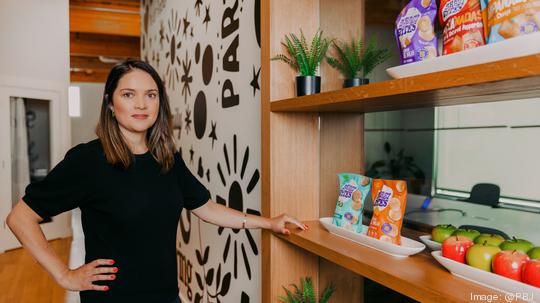
So our assortment has been greatly optimized, we discontinued lines and flavors that were not working or getting enough traction or had the proper margin to survive in the marketplace. Overall, there’s optimism in our organization that we’re doing the right things, and that we survived the hardest times of the last two years.
On meeting the challenge of a post-Covid workforce
Ruiz: The big thing that we really wanted to focus on is getting a diversity of voices and perspectives in the firm. Architecture, right, wrong or indifferent, especially in Portland is very much white, and, in higher positions, leadership positions are very much white and male. Since our founding, and really, in the last two or three years, we’ve been very intentional about recruiting folks of color, and folks with varied life experiences. But in order to recruit, you have to create a welcoming environment.
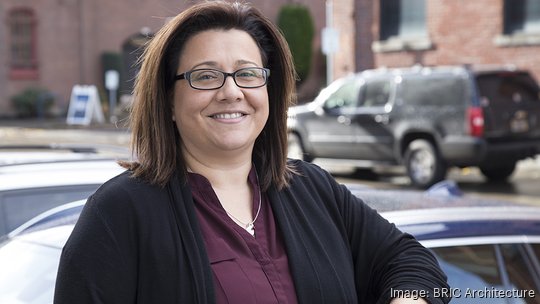
That’s given us the flexibility that we have to provide in order to compete. Because if you want people to work a certain way...people want flexibility in their day, they want flexibility in their life. Core to our mission, too, is, if we’re being successful, we share that success with staff. We’re not incentivizing them as much as just rewarding them for their hard work.
Guerrero: I really value management as a collaboration. I try to bring my employees to the table for things like product development, to really work together as a team and management. With that, we find ways to make the work environment better for lifestyle, whether that’s four-day work weeks (which the company has had for years), or having people who are only working 30 hours. Or, people who work in multiple aspects of the business, because we have production, we have delivery, and we have sales (reps) out at events.
On staying in Portland
Soltero: I’m going to try to tough it out. I wanted to go (to Tigard). Outside of Portland, the cities are more willing to work with you. Tigard was calling me all the time, asking, “What can we do?” It was really nice to be wanted. Here, you just feel like they don’t even care. You are just a number. And it’s hard to get anything done.
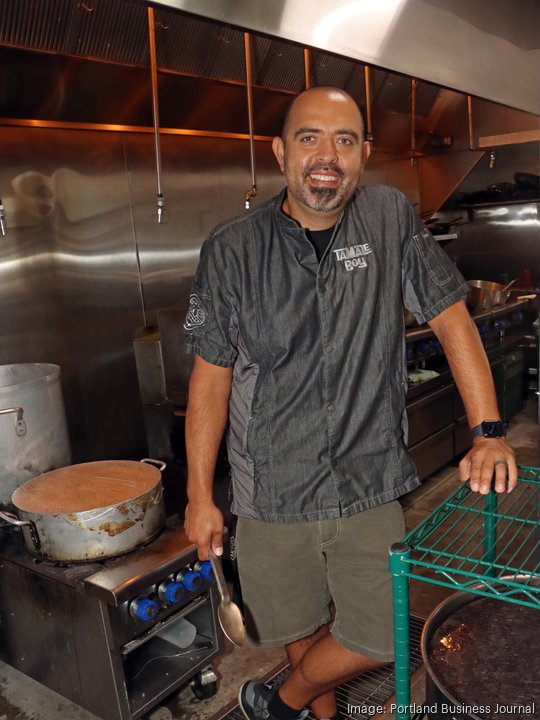
Ruiz: If we are trying to draw people to Portland, then it has to be a safe place for them to be. That is the big elephant in the room. Nationally, Portland’s reputation is doing harm to businesses. For us, it’s less about people walking in our doors, but more like our employees are concerned. We’re in the Pearl, we are fairly safe, but we’re still seeing transients come into the building and the houselessness on the street. It is difficult to think about that in the context of it being a problem for our business, when really, it’s a problem for humanity.
And then, there are very few big rooms, whether it is at the government level in boardrooms, that look like [the room in which the roundtable was held]. In order for people to think differently, the rooms have to change. Part of it is investing in your people who have varied experiences, to raise them up, so that the people tasked with making decisions in boardrooms, in the Legislature, are folks who more closely reflect the constituency that you’re trying to serve.
Rocha: Top of mind for every Portlander is safety. Jaime mentioned people breaking into his restaurant, for me, it’s our headquarters in Central Eastside. We moved there when that neighborhood was recovering and growing. There was a vision for a thriving place in Portland, where restaurants are flocking, where creative and tech headquarters were moving. We set up shop there. And over the last three years, we have seen deterioration right in front of our eyes.
I want to stay. As a leader in my business I’m always fighting for Portland, and want to stay. But I have been challenged inside my organization when my employees are not (feeling) safe. The whole building turned over and we stayed. My leadership team is saying we have to move because of safety. And I’m (favoring the notion of), let’s stay and push through, but at some point, I’m going to lose that battle.
Somebody under the influence (recently broke into the building) and they flooded the other half of our building. Those businesses almost lost everything and were out of a place to work for six months. If we were on that side of the building, I would have lost the battle to stay in Portland that day. We would have moved to the ‘burbs.
On what the city and elected leaders can do to support their businesses
Soltero: On the building (and permitting side) the work (by Commissioners Mingus Mapps and Carmen Rubio) to streamline everything, get everything to go faster and be more friendly, I think they are on the right path. But, I don’t know how long that is going to take and honestly, a lot of people don’t have the patience or the ability to wait for the process.
Guerrero: Focus some of these enterprise zone areas and tax incentives on small manufacturers and small business instead of focusing on the big real estate and the big business, which is what is happening. I know that’s shiny and fancy and a lot of dollars, but what’s the backbone of our city? It’s small business, that’s what is bringing people in. Put some of those tax incentives here.
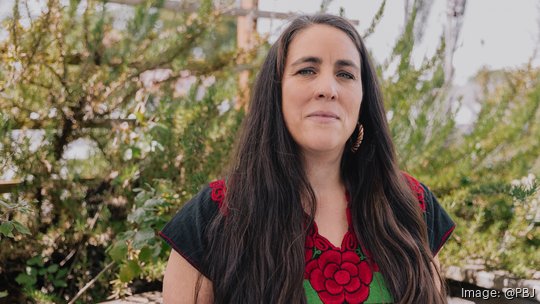
Rocha: As a Portland resident and someone who wants to believe in the recovery, I think we all can get around the high taxes, of Multnomah County in particular, if we’re getting a place that’s vibrant, that has the beautiful restaurants and [pointing to Guerrero and Soltero] the salsas and the tamales and all the things around you. I want to bike my kids to school, I want that life. That’s the life we all signed up for.
And then the higher taxes come in, and you say, Okay, I believe in this, I believe in, daycare for all and I want to support it. But we want (basic) services. So when you have the higher taxes and then you don’t have those services, it puts you in a situation in which, after a while, we have to make a choice.
Soltero: The person on the city council who has reached out to us has been Carmen. She’s been pretty proactive in trying to get all of our, especially Latino voices, in. Mingus, and I think everybody now, is starting to reach out to business owners just because they are getting ready to run for mayor and other positions. But at least they are trying to hear us out.
On what keeps you excited about your business
Guerrero: We’re a manufacturer, and while there are a lot of very small manufacturing places (locally), there are almost no medium-sized places, and then there’s a couple really big ones. A lot of us in my space have been talking collaboration as being the way forward, where we can support startups and smaller businesses, and do manufacturing where we can still source locally.
Rocha: We’re optimistic about having lived through the pandemic and supply chain issues and hyper-high inflation. And now we’re at a place where we can run a business again. And that feels good. That’s something we can build on.
Ruiz: We have, over the last couple of years, increased the focus on our equity-based approach in the way we do our work. It is gaining traction. We are seeing demand for that more in the industry and specifically in public work. The ability to impact those who are closest to the problem, and typically furthest from the solution, is something that we’re seeing greater potential for now.
Soltero: I’m just excited. We’ve got a new space and we’re actually owning a building, that’s really big for our company especially since I’m going to (convert to) Employee Stock Ownership to stabilize the leadership and management team. It’s another little space and hopefully we do well. It’s going to be going back to my mom’s side, we’re doing Sinaloa cuisine. Tamale Boy has always been about highlighting all parts of the Republic of Mexico and getting plates from every region. We’ll first try it out with Sinaloa and then maybe we can change it every year to a different state.
